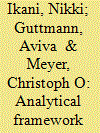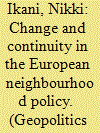|
|
|
Sort Order |
|
|
|
Items / Page
|
|
|
|
|
|
|
| Srl | Item |
| 1 |
ID:
171230


|
|
|
|
|
| Summary/Abstract |
This paper develops a novel theoretical framework for the conduct of postmortems after major foreign policy surprises for the European Union and its member states. It proposes a taxonomy of surprise which elucidates how officials or organisations experience both sudden and slower-burning threats. It argues that foreign policy surprises in European settings require a closer look at who was surprised, in what way, and when. The paper outlines six vital performance criteria and three key attenuating factors, allowing us to better ground judgements about foreign policy performance as well as to advance realistic recommendations on how to improve.
|
|
|
|
|
|
|
|
|
|
|
|
|
|
|
|
| 2 |
ID:
164500


|
|
|
|
|
| Summary/Abstract |
The Ukraine crisis presented a severe geopolitical challenge to European Union (EU) policies in the neighbourhood. This is because during the course of the crisis, Russia openly challenged the EU’s economic and political integration initiatives in the region using economic, informational and eventually military means. As such, the crisis and its escalation has had ramifications across the EU in the fields of security, trade, energy security and regional cooperation. In the wake of the crisis, a clear rhetorical break with previous EU policy was announced by various key actors to respond to these challenges. Yet both the rhetoric and declared ambition for reform in response to the events is not matched by a major revision of actual policy objectives or policy tools. The question at the core of this article is how to explain the changes made to the European Neighbourhood Policy (ENP) following the Ukraine crisis. In order to provide an answer this article will build on historical institutionalism, exploring how two key historical institutionalist insights improve our understanding of the policy changes made to the ENP after the Ukraine crisis: (i) the institutional ‘effects’ and plasticity of the ENP institutions and (ii) temporal contingency. In doing so, this article takes issue with two tendencies in the current literature on policy change in the ENP. First, the lack of analytical engagement with the very notion of policy change, which throughout the literature is rarely defined or conceptualized. Second, the prevailing assumption that one should not be surprised that in the case of ENP reform after the Ukraine crisis there has been little change, due to the prevalence of policy inertia. It is argued that this oversimplifies both policy continuity and policy change. By paying particular attention to the decision-making process preceding change, this article thus aims to shed new light on the issue of EU foreign policy change.
|
|
|
|
|
|
|
|
|
|
|
|
|
|
|
|
| 3 |
ID:
190853


|
|
|
|
|
| Summary/Abstract |
The study of why and when governments are caught out by strategic surprise has been a major occupation of intelligence studies, international relations, public administration and crisis management studies. Still little is known, however, about the structural vulnerabilities to such surprises in international organisations such as the European Union (EU). EU institutions themselves have not undertaken rigorous investigations or public inquiries of recent strategic surprises, instead relying on internal review processes. In order to understand the most common underlying problems causing surprise in the EU context, this paper adapts and tests insights from the strategic surprise literature. It elaborates a theoretical framework with five hypotheses about why the leadership of EU institutions has been prone to being caught by surprises in foreign affairs: limitations in collection capacity, institutional fragmentation of policymaking, organisational culture, member state politicisation, and cognitive biases arising from collective ideas and norms. These hypotheses are tested using a post-mortem approach investigating two significant strategic surprises: the start and spread of the Arab uprisings of 2010/11 and Ukraine–Russia crisis of 2013/14.
|
|
|
|
|
|
|
|
|
|
|
|
|
|
|
|
|
|
|
|
|